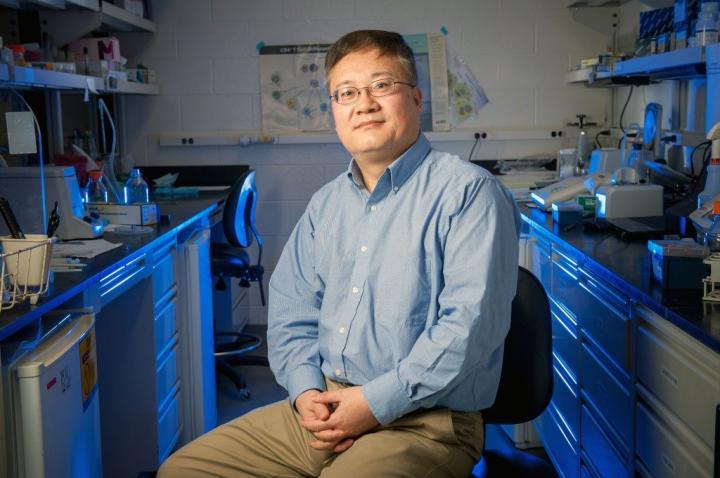
Credit: Virginia Tech
In the race to create a universal flu vaccine not dependent on predicting strains of flu, the Virginia-Maryland College of Veterinary Medicine’s Department of Veterinary Medicine at the University of Maryland College of Agriculture and Natural Resources has been awarded a $3.1 million grant.
The grant comes from the National Institute of Allergy and Infectious Diseases with the National Institutes of Health.
The funding comes on the heels of the veterinary department’s previous work in this area, particularly the development of a technology for an intranasal vaccine that could be used in place of an injection into the muscle tissue. This new vaccine delivery technique not only would protect against the flu virus before it enters the body, but would be safer and more effective for higher-risk populations, such as the young and the elderly.
Because some 20 percent of the U.S. population contracts the flu each year, a figure that spikes even higher worldwide, the development of a new and improved universal flu vaccine stands to have significant global impact.
“Developing a universal vaccine is a hot topic in the world now,” said the grant’s principal investigator, Xiaoping Zhu, associate dean and chair of the Department of Veterinary Medicine at the University of Maryland. “The current vaccine for seasonal flu provides only about 20 to 30 percent protection in recent years, which is low. Many people complain that they get the vaccine, but still get infected. I am glad our college can be an important player in the effort to solve this issue.”
Varying from year to year, the effectiveness of the current vaccine is largely based on how accurately the World Health Organization and associated labs can predict that strains that will be prominent in the next flu season. Once predictions are established, between seven and nine months are required to produce the vaccine, during which time naturally occurring flu strains may change.
“The seasonal flu vaccine is always behind the flu season,” said Zhu. “But if we can focus on conserved regions of antigens with our vaccine that are common in all flu viruses, the strain won’t matter. That is the goal of a universal flu vaccine.”
In addition, current seasonal flu vaccines are ineffective against pandemic flu events, which spread quickly around the world. These catastrophic events, such as the 1918 Spanish flu that killed millions and nearly ended World War I, are typically the result of antigenic shift, during which viruses can exchange genetic information and move across species.
“Pandemics still threaten our society globally, with the latest case in 2009 jumping from pigs to humans as H1N1 swine flu,” said Zhu. “In these cases of antigen shift, the seasonal flu vaccine won’t help, but a universal vaccine would.”
Zhu and his team at the University of Maryland — Weizhong Li, assistant research professor in the Department of Veterinary Medicine; and Susan Park Ochsner, Zhu’s former graduate student and now a postdoctoral fellow at Harvard Medical School — have worked on a universal flu vaccine for more than a decade, formulating preliminary data and preparing to patent an innovative intranasal delivery technology.
A protein-based process, intranasal delivery through the nose cavity and directly into the lungs can induce local immunity to the flu virus, protecting recipients before the virus can infect them. Such a method would especially benefit higher-risk populations that are more likely to react negatively to a traditional flu vaccine that, administered intramuscularly, contains a small amount of the inactivated virus.
“This is very competitive work with a huge impact on the whole world, and many other labs are working on a universal vaccine, but we used our unique idea and technology to secure this funding,” said Zhu. “We have a track record of several publications around this technology that is unique and novel.”
Mindful of the One Health aspect of his work, Zhu is committed to making headway in combating diseases like the flu that both affect and travel between animals and humans. And he is more than willing to test out the new vaccine. “I’ve told my team that I will be the first,” he said. “When it’s ready, I’ll be the first to use it on myself.”
The Virginia-Maryland College of Veterinary Medicine serves as the in-state veterinary college for residents of Virginia and Maryland. Locations include the main campus in Blacksburg, Virginia, the Marion duPont Scott Equine Medical Center in Leesburg, Virginia, and the Gudelsky Veterinary Center in College Park, Maryland.
This news is from a University of Maryland news release.
###
Media Contact
Alison Elward
[email protected]
Original Source
http://vtnews.




